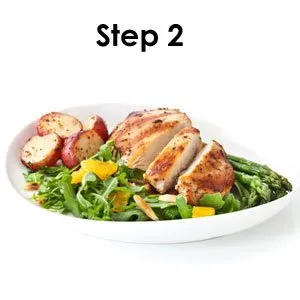Choose healthier fats
- Increase omega 3 fatty acids
- Eat other foods high in omega 3 fatty acids daily
- Eat fish high in omega-3 fatty acids twice a week
- Eat more grain fed meats
- Choose wild caught fish and shrimp over farm raised
- Decrease consumption of omega 6 fatty acids
- Check ingredients on food labels
- Decrease use of cooking oils high in omega-6 fatty acids
- Do not exceed smoke point when cooking with oils
- Consider use of coconut oil, organic broth, or water
- Ask your server what cooking oils will be used in preparing your dish
- Consider using olive oil (high in monounsaturated fat) instead of bottled salad dressing and other oils
- Avoid trans fatty acids
- Avoid margarine (hydrogenated or partially hydrogenated oils). Instead, consider using small amounts of olive oil with optional salt and garlic powder
- Try avoid restaurants possibly using trans-fats
- Reduce hidden trans-fats by examining ingredients and nutrition values on food labels
Eat lower fat foods
• Eat lower fat cuts of meat
• Choose milk with lower fat (2%, 1%, 1/2%, Skim or non-fat)
• Choose lower fat cheese (mozzarella, low fat cheese)
• Plan to eat healthfully 6 days a week and only higher fat foods one day a week
• Substitute plain yogurt for mayonnaise in your chicken or tuna salad
• Decrease sandwich spread or salad dressing by progressively adding plain yogurt
• Reduce hidden oils by examining ingredients on food labels
Appetite control
• Eat a snack before lunch or dinner to reduce tendency to overeat
• Keep a food journal of the quantities of all food eaten
• Rate appetite after each meal or snack: 1) Very Hungry, 2) Hungry, 3) Satisfied, 4) Full, 5) Very Full
• Eat just until comfortable (rating of 3),leave food on the plate if necessary
• Check your diet periodically
• Weigh food and serve pre-determined portion before sitting down to eat
• Limit the number of times you eat out at restaurants
• Eat before being around processed snack foods (eg: party, shopping, etc.)
• Agree to do extra exercise if you eat more than you had planned
Planning
• Write weekly menu with accompanying shopping list
• Keep shopping list (with pen or pencil) conveniently located in kitchen
• Prepare foods the evening before and refrigerate for the next day
So try to follow some of these steps and improve your diet!!!

